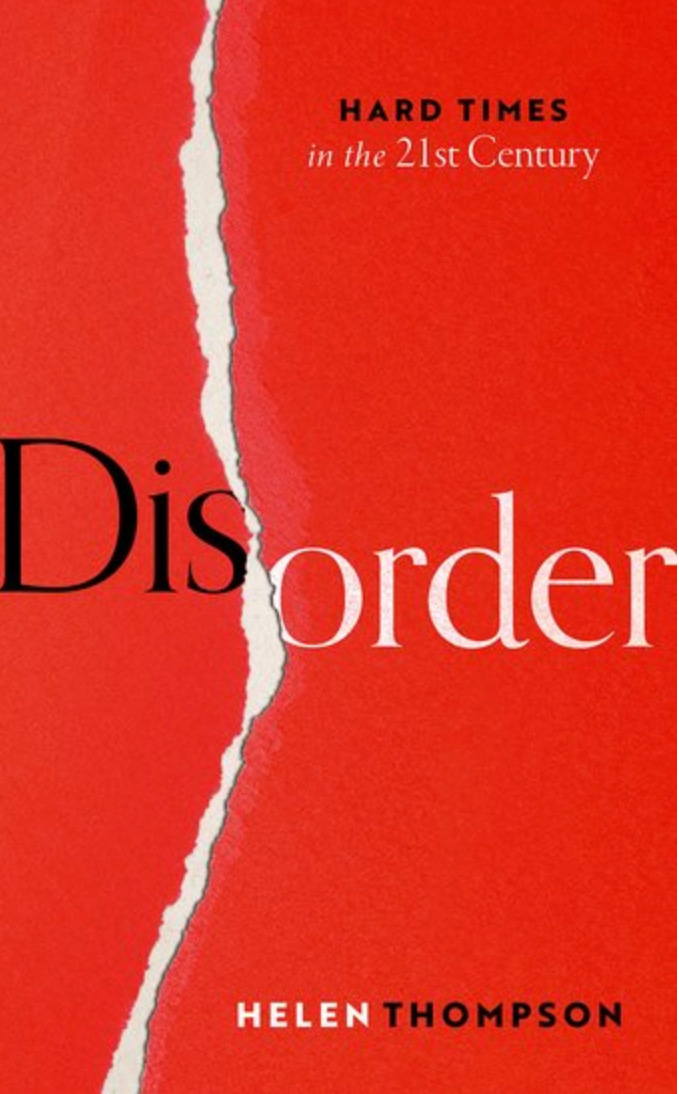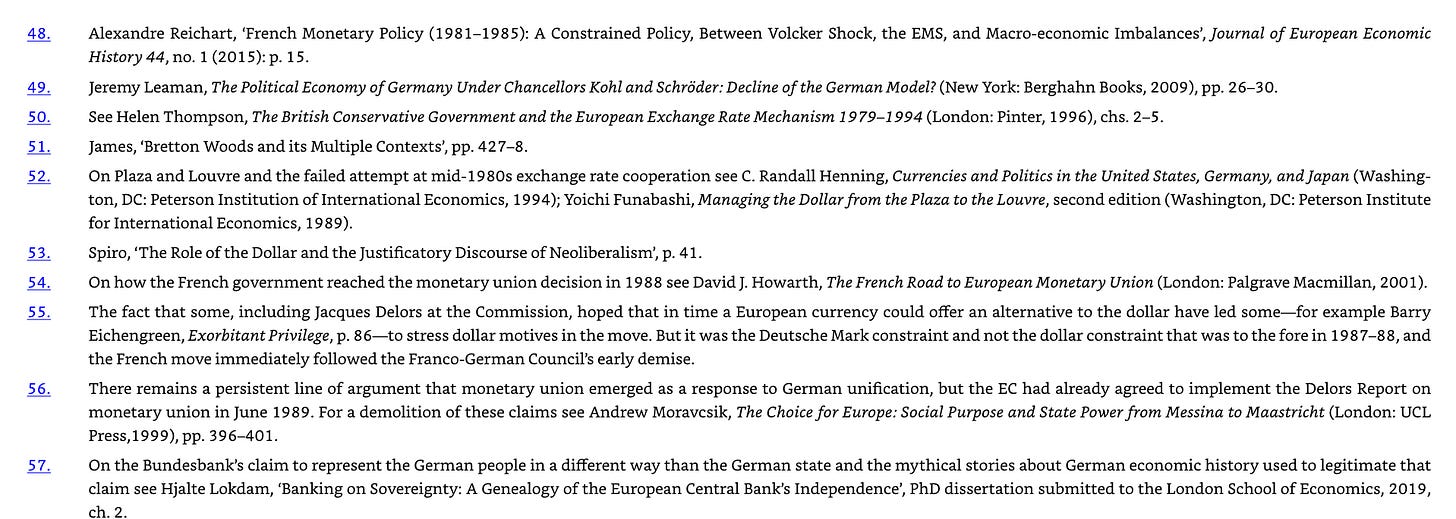Dear Reader,
Greetings from Porto, Portugal, and thank you so much for your kind patience. This is a complicated and busy month for your correspondent. Please do enjoy my first glimpse of Porto’s skyline, with the full moon shining over the Douro River. I have been staying up every night to watch its shining progress.
There will be more soon on London and Portugal via my new Bird on the Wing section of this newsletter. But here I am with our first-ever work of political economy, Helen Thompson’s Disorder. I will be curious for your thoughts on this one.
Review
Disorder: Hard Times in the 21st Century
Helen Thompson
Oxford University Press
384 pages
$27.95
It’s hard to beat the pinball machine, not only as an example of the decadent flowering of late capitalism, but also as a metaphor for the system itself. You plug the beast into a wall socket, and then use your powers of will, timing, and flipper finesse to get your precious silver orbs (your capital) to pay off, within a noisy, highly elaborated, and often unpredictable environment.
When I worked in the investment business in the mid-1990s, there was an Addams Family themed pinball machine in the office kitchen, to which we often turned in order to blow off steam—especially in the late afternoons before corporate earnings reports were released. If you managed to get your ball into the key payoff spot in the middle of the machine, Gomez (Raul Julia) would intone deliciously, “GREEEEEEEEEED!”
According to an expert on YouTube, this is the best-selling pinball game of all time, and a unit in good condition now sells for at least $15,000. Yet another silvery asset bubble, perhaps.
The sine qua non for the game is, of course, that juice in the wall: energy. Reading Helen Thompson’s new book Disorder: Hard Times in the 21st Century, I realized that until rather recently, so much of my own thinking about the world treated energy as a mere feature of the societies we live in . . . when in truth it is the driving force. The information technology boom was completely predicated (as is pretty much every element of our way of life) on cheap and reliable energy, mostly derived from burning the products of ancient sunlight.
Helen Thompson is Professor of Political Economy at Cambridge University. Her previous book was Oil and the Western Economic Crisis (2017), and she has also written on the effects of the US-China trade relationship on US domestic politics, and on the relationship between capitalism and democratic legitimacy. She was a frequent guest on the recently-discontinued podcast Talking Politics, which I know was a mainstay listen for a number of Frugal Charioteers during its five-year run.
Given Thompson’s body of work and her deep engagement with current events, she is ideally situated to take on the broad sweep of the last hundred or so years, and to ask the question: “How did we get here?”—with “here” referring to the democratic backsliding and rising geopolitical instability that have now become firmly entrenched trends. She does this here by presenting three intricate and interlocking sets of histories: of energy geopolitics, of global finance, and of liberal democracies. Importantly, she adds much-needed context to our awareness of the domestic political movements of the past fifteen years.
Much has been written and said about the disruption of the last decade. This has often been framed around a populist nationalism, its relation to the 2007–8 economic crash, and the fall of a purportedly liberal international order. But at the systemic level much remains unexplained, not least because energy has largely gone unrecognized as an important cause of the geopolitical and economic fault lines at work . . . Structural changes around energy and finance always bring tumultuous geopolitical consequences.
It must be said that Thompson’s gifts for context and nuance cannot be exercised without accompanying density of story-telling and analysis. This book is more Christmas pudding than angel food cake, and it is loaded with piquant bombs of insight. Herewith, a sampler:
[Due to a lack of domestic deposits] . . . The age of oil would not allow for a European world power or a European continental empire.
The Suez crisis definitively broke western European governments’ acceptance of the [US] prohibition on Soviet oil imports.
Russia’s energy power is a persistent feature of the geopolitical landscape that structurally divides NATO.
Managing transit through an independent Ukraine and later Belarus is now a strategic burden for Moscow, where it had to regulate transit fees with two states with an opportunity to divert supply to themselves. How Russia handled these relations left an external border problem for the EU.
Indeed, with her focus on strategic transit hubs for oil and gas, Thompson calls out Ukraine and Turkey as key geopolitical fault lines on the map of the world. Disorder was written before, and published just two months after, Russia’s invasion of Ukraine, and it offers prescient and truly invaluable background for anyone seeking to understand the lead-up to the war.
Thompson’s fascinating history of natural gas and pipeline politics is alone worth the price of admission, placed as it is within the context of the US shale oil boom, which, she argues, has been extremely destabilizing and whose marginal economics were artificially bolstered by the Fed’s quantitative easing. You don’t have to buy into John Mearsheimer’s position that the war in Ukraine is the fault of the US to find the following eerie:
For Putin, a line appeared to be crossed when, in December 2019, the US Congress imposed new sanctions on companies involved in building a second Nord Stream pipeline under the Baltic Sea between Russia and Germany, which led the main contractor to suspend work with around 150 kilometres of the 1230-kilometer pipeline left to build.
After reading Thompson’s subsequent analysis of China’s Belt and Road initiative, and of the Xi regime’s drive to expand and diversify its supplies of natural resources, I was prompted to wonder whether Putin’s attempt to lock down Russia’s terrestrial access to Western European gas markets was partly motivated by a desire, with time ticking on the petro clock, to ensure that Russia does not become so substantially dependent on China for its cash flow as to become a vassal state of the PRC—this in the wake of Nord Stream 2 being stymied by US sanctions. The fact that Germany has now cancelled Nord Stream 2 may not matter as much as we all might hope. In fact, as Thompson makes clear, the US had already taken steps to ensure that the project would never be completed. In recent interviews, however, Thompson has remained skeptical that Germany will have the political will and the practical ability to wean itself from Russian gas. It is just too soon.
This really is a book to set you wondering, and it also set me to pondering America’s use of sanctions as a blunt force instrument in geopolitics, a theme to which Thompson perhaps gives slightly short shrift, not in terms of her narrative, but possibly in terms of her conclusions. In a era of novel digital currencies, one wonders if China will find an opening to create a dollar alternative that can allow players to skirt US sanctions viewed as unfair, excessive, or simply inconvenient. Yet her discussion of the extraordinary power wielded in other ways by the Fed and by US-based financial institutions is quite magisterial. She vividly explains just how much clout America has brought to bear via the dollarization of oil, and also the discretionary extension of swap lines, which can allow governments and institutions to swim or cause them to sink. Pointedly, she remarks on the 2013 refusal of the Fed to open a swap line to the Ukrainian government, which sent Victor Yanukovich directly to the Kremlin in search of a credit lifeline. One of the benefits of her historical accounts is that by the end of them you see Quantitative Easing as the culmination, or maybe apotheosis, of Anglo-capitalist neoliberalism’s internal contradictions.
You certainly don’t have to agree with every emphasis or argument in this book in order to marvel at its incisiveness and clarity of thought. A single sentence captures essence and nuance; a paragraph can serve as a field guide to a crucial episode. Thompson’s treatment of Jimmy Carter’s failed attempts to speak truth about energy to the American people and get them on board with a green agenda reads like an early diagnostic x-ray of the country’s civic frailty and withered capacity for shared sacrifice and expansiveness of vision. And her deft ability to shuttle between time periods is nothing short of miraculous—though her approach can at times be somewhat taxing for the lay reader. As in any great work of scholarship, the footnotes offer their own particular journey.
For Americans who are understandably focused on today’s hyper-partisanship, Thompson’s dispassionate gaze can certainly prove clarifying. She reminds the reader of Bill Clinton’s about-face on trade with China, of the bipartisan debacle of Fannie Mae that made the housing crisis so much worse, and of the manner in which the Tea Party was quickly captured by monied interests led by the Kochs. One of her key explanatory terms, which has quite a bracing ring to it, is “aristocratic excess.” Yet tax policy receives surprisingly little attention, other than a reference to the world’s abundance of tax havens, which the author argues constrain elected leaders interested in redistribution as a means of addressing rising wealth inequality. Surprisingly, Thomas Piketty does not appear in the index. Nor is much said about regulatory capture, and the failure of OECD countries to price the harms of burning carbon.
If, on the other hand, you have always wondered about the history of the EU and the Euro, look no further for an outstanding (if highly detailed) summary account. Yes, I am sure there are necessary debates to be had about factors and their weights. But if you are curious about Brexit, or about why Mario Draghi and his fellow technocrats are running Italy despite a lack of popular support, you will find enlightening answers here.
I do hope that Helen Thompson will soon train her penetrating mind on the geopolitics of climate. Disorder does not address the ways in which climate change may now be exacerbating the very trend of increasing instability that her book describes so well. There is an argument, for example, that the Syrian civil war was sparked by a long-term drought worsened by climate change. Historic drought is a situation now shared by the southwest region of the United States, all as heat records continue to fall—month after month, all around the world.


One fact that Thompson does make quite clear is that a green-energy world—however necessary—will be subject to the same realpolitik dynamics as the post-QE, petro-fired one that we inhabit today. The game of geopolitical pinball powered by money and energy will never be pure fun. Nor will it be pure.
Other Voices, Other Forms
A shout-out to the data team at The Financial Times, which has created truly informative graphics that underscore the energy consequences of Russia’s war on Ukraine. As you can see below, Germany alone will have to try to lay hands on over 100 billion cubic meters of gas per year in order to end its use of Russian gas. The excellent article from which this graphic is taken, “‘There Is Nothing Else Out There’: Why Europe is Hooked on Russian Gas” is outside the FT’s paywall.
Poem of the Week
For Your Reading Radar
Milkweed Press has just released The Life and Death of a Minke Whale in the Amazon, a book of essays by Brazilian journalist Fábio Zucker. According to the publisher, Zucker “shares intimate stories of life in the rainforest and its surrounding cities during an age of raging wildfires, mass migration, populist politics, and increasing deforestation.”
Bookshop of the Week
For one of the final episodes of its Talking Politics podcast, The London Review of Books ran an interview with Helen Thompson in which she discussed Disorder. And the LRB bookshop hosted a brilliant conversation about the book between Thompson and British economist Ann Pettifor. If you are daunted by the task of reading Thompson’s tome in full, the interviews will afford you an overview broader than I have been able convey in this short review.
Let’s visit the LRB Bookshop, which is located in the heart of Bloomsbury.
That’s it for this week. Although publication dates may be a bit sporadic this summer, I shall be with you! xo Nicie













Great post! I just returned from London and paid LRB due homage. Ironically I was just doing research on the Camino Potruguese. Not sure we will get it on the calendar this year but its nice to dream, and your photo of Porto certainly entices. Enjoy! Delia